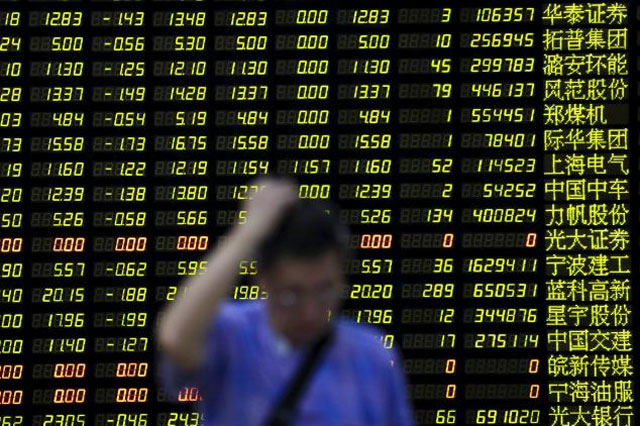
After dropping more than 1,000 points, or almost 7 per cent, at Wall Street's open, the Dow Jones industrial average cut losses but was still off almost 4 per cent in afternoon trading.
The Standard & Poor's 500 index was down 4 per cent and appeared to be on track for correction territory, or a 10-per cent drop from its May record high. A key measure of US equity volatility, the CBOE Volatility Index, or VIX, shot above the 50 mark for the first time since 2009 before dropping back to 36 as US investors turned their focus back to domestic issues.
European stocks closed off 5.4 per cent after Asian shares slumped to 3-year lows when a three-month-long rout in Chinese equities threatened to get out of hand. US markets had some reprieve after Europe closed but then pushed back down towards earlier lows in late afternoon.
"There was clearly some forced selling, whether it was forced selling or just losses for large, aggressive hedge funds," said Rick Meckler, president of LibertyView Capital Management in Jersey City, New Jersey. "It got very sloppy, and you then saw buyers start to emerge. But a lot of those buyers were short-term in nature and took some of their gains around lunchtime. Now we're seeing a second wave of selling."
The Dow Jones industrial average was down 654.14 points, or 3.97 per cent, at 15,805.61. The S&P 500 lost 4.06 per cent to 1,890.9 and the Nasdaq Composite dropped 3.78 per cent to 4,528.23. US traders had rushed for the exits in Monday's first half hour of trading when deepening concerns about a China-led global economic slowdown and tumbling commodities prices followed a 5 per cent decline in the S&P and Dow Thursday and Friday.
"Anybody with a pulse was nervous when the market opened. We're still going to see significant price swings both up and down before the day ends today," said Michael James, managing director of equity trading at Wedbush Securities in Los Angeles. By 3 pm EDT (1900 GMT) trading volume was near 10 billion shares, which was still shy of Friday's hefty 10.6 billion shares but well above the 7 billion daily average for the month to date, according to BATS Global Markets.
Coming up to the US close, the day's swings had strategists seeking a read on the rest of the week. "If you see it close in the upper half of the day's range, that is a good sign in terms of the next few days," said Katie Stockton, chief technical strategist at BTIG in New York.
Oil prices settled down sharply after plunging to six-and-a-half year lows. Safe-haven US government and German bonds, as well as the yen and the euro, rallied as currency concerns kicked in due to China's recent currency devaluation.
US crude settled down 5.5 percent at $38.24 a barrel after falling as low as $37.75 earlier. Brent settled off 6 per cent at $42.69 after falling as low as $42.51 to take them under January's lows for the first time.
Worries about weaker demand from normally resource-hungry China added to global supply glut concerns. The S&P's energy index was the weakest performer with a 5.2 per cent decline in late afternoon trading. Copper, seen as a barometer of global industrial demand, hit a six-year low, and Nickel fell sharply.
Great fall of China
The slump in Chinese stocks was their worst performance since the depths of the global financial crisis in 2007 and wiped out what was left of 2015's gains, which in June stood at more than 50 per cent. Many traders had hoped Beijing would take support measures, such as an interest rate cut, over the weekend after China's main stocks markets slumped 11 per cent last week.
With serious doubts emerging about the likelihood of a US interest rate rise this year, the dollar was down 1.6 per cent against other major currencies after falling as much as 2.5 per cent earlier in the day.
The Australian dollar fell to more than six-year lows and many emerging market currencies also plunged, while the frantic dash to safety pushed the euro to a seven-and-a-half month high of more than $1.17.
MSCI's broadest index of Asia-Pacific shares outside Japan fell 5.4 per cent to a more than three-year low. Tokyo's Nikkei ended down 4.6 per cent and Australian and Indonesian shares hit two-year troughs.
London's FTSE 100, with its large number of global miners and oil firms, ended down 4.7 per cent for its 10th straight decline - its worst run since 2003. The MSCI all world stock index was off 3.7 per cent.



1732626034-0/BeFunky-collage-(92)1732626034-0-165x106.webp)


1732618327-2/Untitled-design-(7)1732618327-2-270x192.webp)










COMMENTS
Comments are moderated and generally will be posted if they are on-topic and not abusive.
For more information, please see our Comments FAQ